CentOS7 安装Oracle 11g R2
一、安装环境
CentOS Linux 7
Oracle 11g R2
二、安装前准备
2.1. 修改主机名称
#查看主机名称 [root@cdtdw ~]# hostnamectl status [root@cdtdw ~]# hostnamectl set-hostname cdtdw
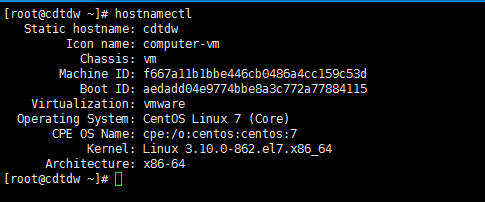
因为我的主机名就是:cdtdw,就不用再更改了
2.2. 修改hosts文件
修改hosts文件是为了保持ip 与 主机名对应
[root@cdtdw ~]# vim /etc/hosts #新增ip与主机名对应 127.0.0.1 cdtdw 10.0.0.26 cdtdw #本机ip地址 #重启机器 [root@cdtdw ~]# reboot
2.3. 关闭Selinux(太深奥,先关闭了)
[root@cdtdw ~]# sed -i "s/SELINUX=enforcing/SELINUX=disabled/" /etc/selinux/config [root@cdtdw ~]# setenforce 0

2.4. 防火墙开放 1521 端口
#centos7防火墙与centos6防火墙有比较大差异 #关闭centos7防火墙 [root@cdtdw ~]# systemctl stop firewalld.service #关闭开机启动 [root@cdtdw ~]# systemctl disable firewalld.service #安装iptables防火墙 [root@cdtdw ~]# yum install iptables-services [root@cdtdw ~]# vim /etc/sysconfig/iptables #新增1521接口 -A INPUT -m state --state NEW -m tcp -p tcp --dport 1521 -j ACCEPT #设置开机启动 [root@cdtdw ~]# systemctl enable iptables #重启iptabls服务 [root@cdtdw ~]# systemctl restart iptables.service
下面是修改:/etc/sysconfig/iptables,修改内容如下图:

2.5 安装所需的软件包
查看Oracle安装文档中列出的Package Requirements可以查看在不同平台上需要的软件包。
binutils-2.23.52.0.1-12.el7.x86_64
compat-libcap1-1.10-3.el7.x86_64
gcc-4.8.2-3.el7.x86_64
gcc-c++-4.8.2-3.el7.x86_64
glibc-2.17-36.el7.i686
glibc-2.17-36.el7.x86_64
glibc-devel-2.17-36.el7.i686
glibc-devel-2.17-36.el7.x86_64
ksh
libaio-0.3.109-9.el7.i686
libaio-0.3.109-9.el7.x86_64
libaio-devel-0.3.109-9.el7.i686
libaio-devel-0.3.109-9.el7.x86_64
libgcc-4.8.2-3.el7.i686
libgcc-4.8.2-3.el7.x86_64
libstdc++-4.8.2-3.el7.i686
libstdc++-4.8.2-3.el7.x86_64
libstdc++-devel-4.8.2-3.el7.i686
libstdc++-devel-4.8.2-3.el7.x86_64
libXi-1.7.2-1.el7.i686
libXi-1.7.2-1.el7.x86_64
libXtst-1.2.2-1.el7.i686
libXtst-1.2.2-1.el7.x86_64
make-3.82-19.el7.x86_64
sysstat-10.1.5-1.el7.x86_64
Oracle ODBC Drivers
On Oracle Linux 6, Red Hat Enterprise Linux 6, and Asianux Server 4:
unixODBC-2.3.1-6.el7.x86_64 or later
unixODBC-2.3.1-6.el7.i686 or later
unixODBC-devel-2.3.1-6.el7.x86_64 or later
unixODBC-devel-2.3.1-6.el7.i686 or later
安装软件包
yum -y install binutils compat-libstdc++-33 compat-libstdc++-33.i686 elfutils-libelf elfutils-libelf-devel gcc gcc-c++ glibc glibc.i686 glibc-common glibc-devel glibc-devel.i686 glibc-headers ksh libaio libaio.i686 libaio-devel libaio-devel.i686 libgcc libgcc.i686 libstdc++ libstdc++.i686 libstdc++-devel make sysstat unixODBC unixODBC
2.6. 创建用户组与用户
[root@cdtdw ~]# groupadd oinstall #创建群组
[root@cdtdw ~]# groupadd dba #创建群组
[root@cdtdw ~]# useradd -g oinstall -G dba,oper oracle #创建用户
[root@cdtdw ~]# passwd oracle #设置密码
2.7. 修改kernel内核
[root@cdtdw ~]# vim /etc/sysctl.conf #配置文件内加入 修改以下参数。如果没有可以自己添加,如果默认值比参考值大,则不需要修改。 kernel.shmmni = 4096 #这个内核参数用于设置系统范围内共享内存段的最大数量。该参数的默认值是 4096 。通常不需要更改。 kernel.shmmax = 53687091200 #该参数定义了共享内存段的最大尺寸(以字节为单位)。缺省为32M,对于oracle来说,该缺省值太低了,通常将其设置为50G。 kernel.shmall = 2097152 #该参数表示系统一次可以使用的共享内存总量(以页为单位)。缺省值就是2097152,通常不需要修改。 kernel.sem = 250 32000 100 128 fs.aio-max-nr = 1048576 fs.file-max = 65536 #设置最大打开文件数 net.ipv4.ip_local_port_range = 9000 65500 #可使用的IPv4端口范围 net.core.rmem_default = 262144 net.core.rmem_max = 4194304 net.core.wmem_default = 262144 net.core.wmem_max = 1048586
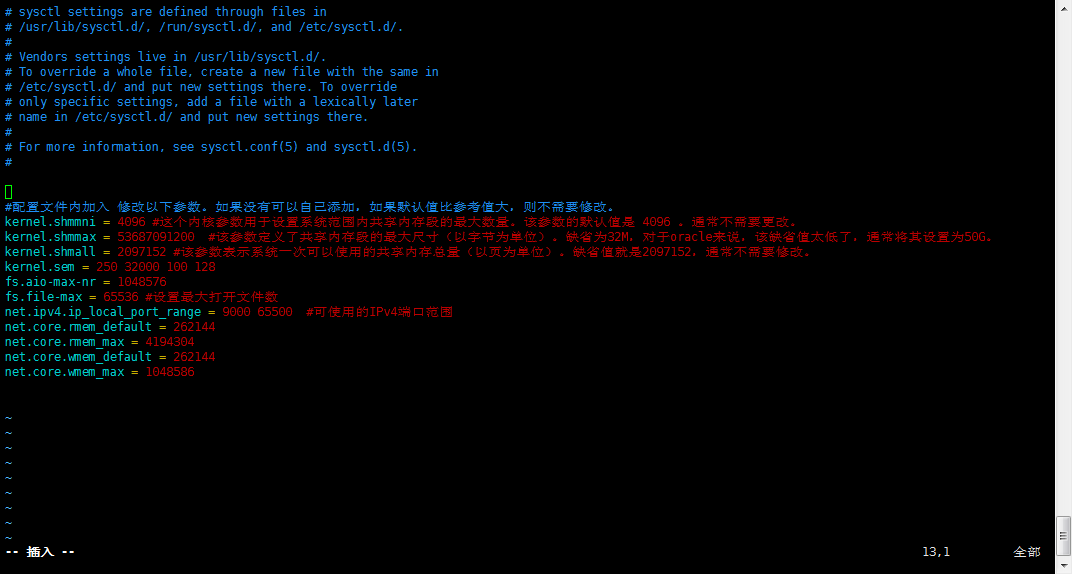
保存后退出并立即生效:
[root@cdtdw ~]# sysctl -p

2.8. 修改系统资源限制
[root@cdtdw ~]# vim /etc/security/limits.conf #配置文件下方加入 cdtdw soft nproc 2047 cdtdw hard nproc 16384 cdtdw soft nofile 1024 cdtdw hard nofile 65536 cdtdw soft stack 10240 #修改用户验证选项 关联设置 [root@cdtdw ~]# vim /etc/pam.d/login #加入以下语句: session required /lib64/security/pam_limits.so session required pam_limits.so #(注意:根据最后一条session规则的注释,应该加在最后一条规则之前)
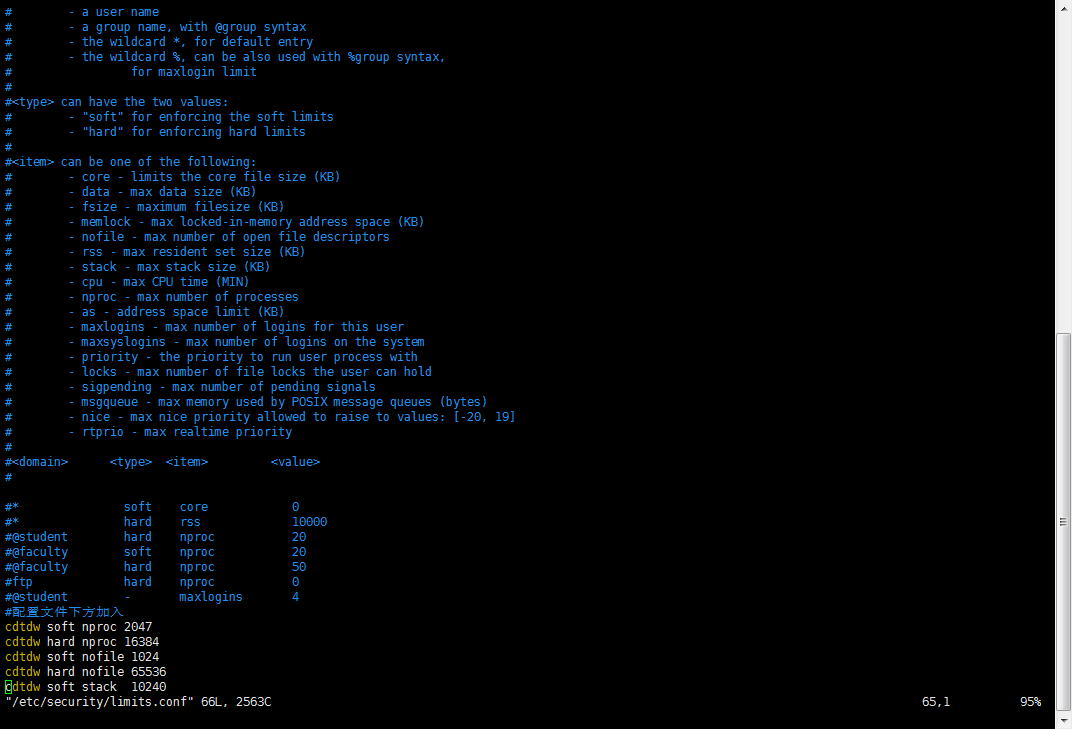
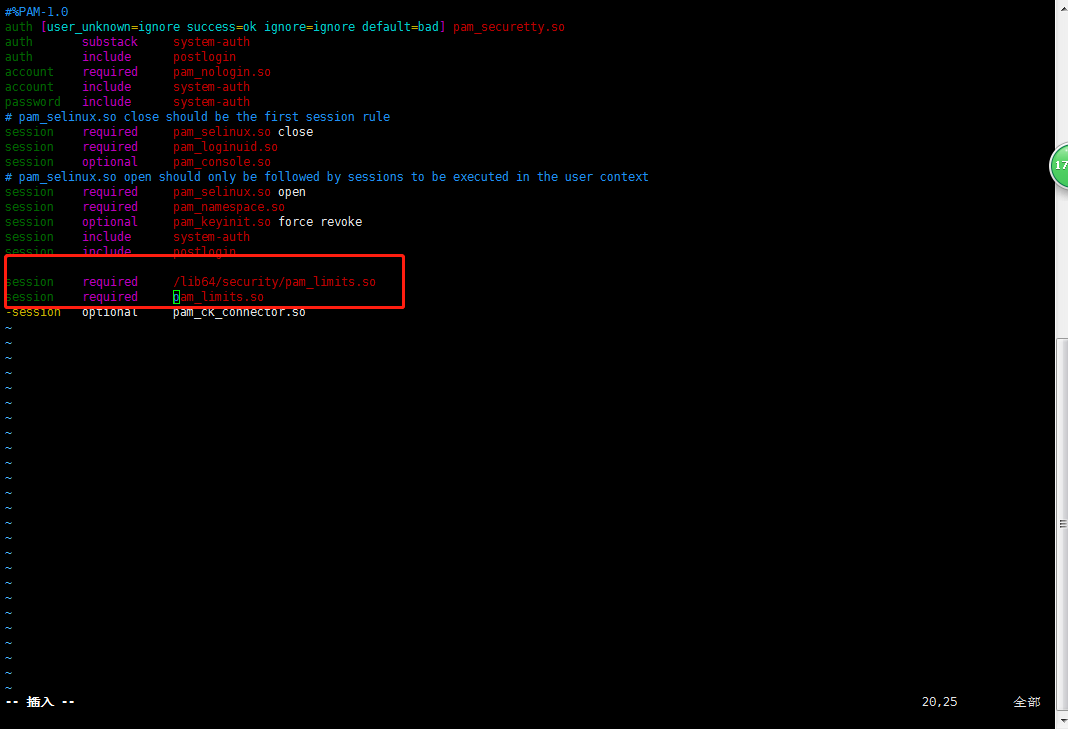
2.9. 创建安装目录与目录权限
#创建安装目录,并赋予用户与用户组 #oracle目录 安装目录 #oradata 数据存储目录 #inventory 清单目录 #fast_recovery_area 恢复目录 [root@cdtdw~]# mkdir -p /data/oracle/product/11.2.0 [root@cdtdw ~]# mkdir /data/oracle/oradata [root@cdtdw ~]# mkdir /data/oracle/inventory [root@cdtdw ~]# mkdir /data/oracle/fast_recovery_area [root@cdtdw ~]# chown -R oracle:oinstall /data/oracle #创建用户 [root@cdtdw ~]# chmod -R 775 /data/oracle #给用户授权目录
2.10. 创建Oracle环境变量,这个只有R1才要,因为现在我安装的是R2,可以不用处理
#11G R1需要,R2可省略 [root@oracle ~]# vim /etc/profile #在末尾增加以下内容 if [ $USER = "oracle" ]; then if [ $SHELL = "/bin/sh" ]; then ulimit -p 16384 ulimit -n 65536 else ulimit -u 16384 -n 65536 fi fi
三、安装Oracle Database
3.1. 上传安装文件到home目录,并解压,我是上传到 /software 文件夹下,解压后如下图:
针对新建的目录需做授权:
[root@cdtdw ~]# mkdir /software [root@cdtdw ~]# chown -R oracle:oinstall /software #创建用户 [root@cdtdw ~]# chmod -R 775 /software #给用户授权目录
然后上传文件到这个文件夹,再进行解压,使用unzip命令

3.2. 准备oracle安装应答模板文件db_install.rsp文件
[oracle@oracle database]$ cp response/* /data/oracle/ [oracle@oracle oracle]$ chmod 755 ./*.rsp #编辑 [oracle@oracle oracle]$ vim db_install.rsp #修改文件中一下内容 //安装类型,只装数据库软件 oracle.install.option=INSTALL_DB_SWONLY //主机名称(命令hostname查询) ORACLE_HOSTNAME=cdtdw // 安装组 UNIX_GROUP_NAME=oinstall //INVENTORY目录(**不填就是默认值,本例此处需修改,因个人创建安装目录而定) INVENTORY_LOCATION=/data/oracle/inventory // 选择语言 SELECTED_LANGUAGES=en,zh_CN // oracle_home *路径根据目录情况注意修改 本例安装路径/data/oracle ORACLE_HOME=/data/oracle/product/11.2.0 // oracle_base *注意修改 ORACLE_BASE=/data/oracle // oracle版本 oracle.install.db.InstallEdition=EE //自定义安装,否,使用默认组件 oracle.install.db.isCustomInstall=false //dba用户组 oracle.install.db.DBA_GROUP=dba //oper用户组 oracle.install.db.OPER_GROUP=dba // **注意此参数 设定一定要为true DECLINE_SECURITY_UPDATES=true
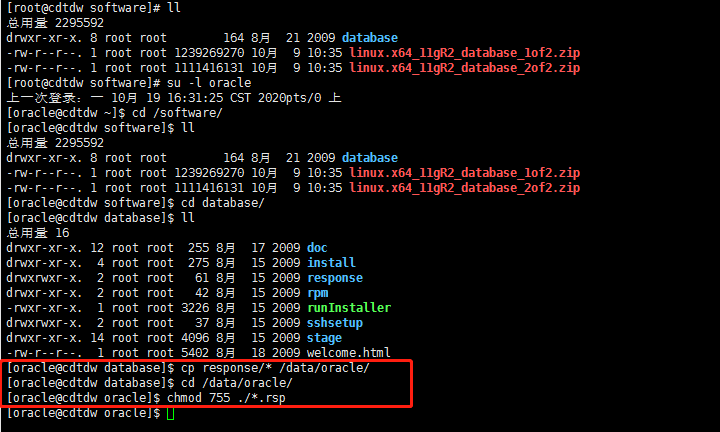
以下为这个文件的所有内容,请留意红色字体内容:
####################################################################
## Copyright(c) Oracle Corporation 1998,2008. All rights reserved.##
## ##
## Specify values for the variables listed below to customize ##
## your installation. ##
## ##
## Each variable is associated with a comment. The comment ##
## can help to populate the variables with the appropriate ##
## values. ##
## ##
## IMPORTANT NOTE: This file contains plain text passwords and ##
## should be secured to have read permission only by oracle user ##
## or db administrator who owns this installation. ##
## ##
####################################################################
#------------------------------------------------------------------------------
# Do not change the following system generated value.
#------------------------------------------------------------------------------
oracle.install.responseFileVersion=/oracle/install/rspfmt_dbinstall_response_schema_v11_2_0
#------------------------------------------------------------------------------
# Specify the installation option.
# It can be one of the following:
# 1. INSTALL_DB_SWONLY
# 2. INSTALL_DB_AND_CONFIG
# 3. UPGRADE_DB
#-------------------------------------------------------------------------------
oracle.install.option=INSTALL_DB_SWONLY
#-------------------------------------------------------------------------------
# Specify the hostname of the system as set during the install. It can be used
# to force the installation to use an alternative hostname rather than using the
# first hostname found on the system. (e.g., for systems with multiple hostnames
# and network interfaces)
#-------------------------------------------------------------------------------
ORACLE_HOSTNAME=cdtdw #主机名
#-------------------------------------------------------------------------------
# Specify the Unix group to be set for the inventory directory.
#-------------------------------------------------------------------------------
UNIX_GROUP_NAME=oinstall
#-------------------------------------------------------------------------------
# Specify the location which holds the inventory files.
#-------------------------------------------------------------------------------
INVENTORY_LOCATION=/data/oracle/inventory
#-------------------------------------------------------------------------------
# Specify the languages in which the components will be installed.
#
# en : English ja : Japanese
# fr : French ko : Korean
# ar : Arabic es : Latin American Spanish
# bn : Bengali lv : Latvian
# pt_BR: Brazilian Portuguese lt : Lithuanian
# bg : Bulgarian ms : Malay
# fr_CA: Canadian French es_MX: Mexican Spanish
# ca : Catalan no : Norwegian
# hr : Croatian pl : Polish
# cs : Czech pt : Portuguese
# da : Danish ro : Romanian
# nl : Dutch ru : Russian
# ar_EG: Egyptian zh_CN: Simplified Chinese
# en_GB: English (Great Britain) sk : Slovak
# et : Estonian sl : Slovenian
# fi : Finnish es_ES: Spanish
# de : German sv : Swedish
# el : Greek th : Thai
# iw : Hebrew zh_TW: Traditional Chinese
# hu : Hungarian tr : Turkish
# is : Icelandic uk : Ukrainian
# in : Indonesian vi : Vietnamese
# it : Italian
#
# Example : SELECTED_LANGUAGES=en,fr,ja
#------------------------------------------------------------------------------
SELECTED_LANGUAGES=en,zh_CN
#------------------------------------------------------------------------------
# Specify the complete path of the Oracle Home.
#------------------------------------------------------------------------------
ORACLE_HOME=/data/oracle/product/11.2.0
#------------------------------------------------------------------------------
# Specify the complete path of the Oracle Base.
#------------------------------------------------------------------------------
ORACLE_BASE=/data/oracle
#------------------------------------------------------------------------------
# Specify the installation edition of the component.
#
# The value should contain only one of these choices.
# EE : Enterprise Edition
# SE : Standard Edition
# SEONE : Standard Edition One
# PE : Personal Edition (WINDOWS ONLY)
#------------------------------------------------------------------------------
oracle.install.db.InstallEdition=EE
#------------------------------------------------------------------------------
# This variable is used to enable or disable custom install.
#
# true : Components mentioned as part of 'customComponents' property
# are considered for install.
# false : Value for 'customComponents' is not considered.
#------------------------------------------------------------------------------
oracle.install.db.isCustomInstall=false
#------------------------------------------------------------------------------
# This variable is considered only if 'IsCustomInstall' is set to true.
#
# Description: List of Enterprise Edition Options you would like to install.
#
# The following choices are available. You may specify any
# combination of these choices. The components you choose should
# be specified in the form "internal-component-name:version"
# Below is a list of components you may specify to install.
#
# oracle.rdbms.partitioning:11.2.0.1.0 - Oracle Partitioning
# oracle.rdbms.dm:11.2.0.1.0 - Oracle Data Mining
# oracle.rdbms.dv:11.2.0.1.0 - Oracle Database Vault
# oracle.rdbms.lbac:11.2.0.1.0 - Oracle Label Security
# oracle.rdbms.rat:11.2.0.1.0 - Oracle Real Application Testing
# oracle.oraolap:11.2.0.1.0 - Oracle OLAP
#------------------------------------------------------------------------------
oracle.install.db.customComponents=oracle.server:11.2.0.1.0,oracle.sysman.ccr:10.2.7.0.0,oracle.xdk:11.2.0.1.0,oracle.rdbms.oci:11.2.0.1.0,oracle.network:11.2.0.1.0,oracle.network.listener:11.2.0.1.0,oracle.rdbms:11.2.0.1.0,oracle.options:11.2.0.1.0,oracle.rdbms.partitioning:11.2.0.1.0,oracle.oraolap:11.2.0.1.0,oracle.rdbms.dm:11.2.0.1.0,oracle.rdbms.dv:11.2.0.1.0,orcle.rdbms.lbac:11.2.0.1.0,oracle.rdbms.rat:11.2.0.1.0
###############################################################################
# #
# PRIVILEGED OPERATING SYSTEM GROUPS #
# ------------------------------------------ #
# Provide values for the OS groups to which OSDBA and OSOPER privileges #
# needs to be granted. If the install is being performed as a member of the #
# group "dba", then that will be used unless specified otherwise below. #
# #
###############################################################################
#------------------------------------------------------------------------------
# The DBA_GROUP is the OS group which is to be granted OSDBA privileges.
#------------------------------------------------------------------------------
oracle.install.db.DBA_GROUP=dba
#------------------------------------------------------------------------------
# The OPER_GROUP is the OS group which is to be granted OSOPER privileges.
#------------------------------------------------------------------------------
oracle.install.db.OPER_GROUP=dba
#------------------------------------------------------------------------------
# Specify the cluster node names selected during the installation.
#------------------------------------------------------------------------------
oracle.install.db.CLUSTER_NODES=
#------------------------------------------------------------------------------
# Specify the type of database to create.
# It can be one of the following:
# - GENERAL_PURPOSE/TRANSACTION_PROCESSING
# - DATA_WAREHOUSE
#------------------------------------------------------------------------------
oracle.install.db.config.starterdb.type=
#------------------------------------------------------------------------------
# Specify the Starter Database Global Database Name.
#------------------------------------------------------------------------------
oracle.install.db.config.starterdb.globalDBName=
#------------------------------------------------------------------------------
# Specify the Starter Database SID.
#------------------------------------------------------------------------------
oracle.install.db.config.starterdb.SID=
#------------------------------------------------------------------------------
# Specify the Starter Database character set.
#
# It can be one of the following:
# AL32UTF8, WE8ISO8859P15, WE8MSWIN1252, EE8ISO8859P2,
# EE8MSWIN1250, NE8ISO8859P10, NEE8ISO8859P4, BLT8MSWIN1257,
# BLT8ISO8859P13, CL8ISO8859P5, CL8MSWIN1251, AR8ISO8859P6,
# AR8MSWIN1256, EL8ISO8859P7, EL8MSWIN1253, IW8ISO8859P8,
# IW8MSWIN1255, JA16EUC, JA16EUCTILDE, JA16SJIS, JA16SJISTILDE,
# KO16MSWIN949, ZHS16GBK, TH8TISASCII, ZHT32EUC, ZHT16MSWIN950,
# ZHT16HKSCS, WE8ISO8859P9, TR8MSWIN1254, VN8MSWIN1258
#------------------------------------------------------------------------------
oracle.install.db.config.starterdb.characterSet=AL32UTF8
#------------------------------------------------------------------------------
# This variable should be set to true if Automatic Memory Management
# in Database is desired.
# If Automatic Memory Management is not desired, and memory allocation
# is to be done manually, then set it to false.
#------------------------------------------------------------------------------
oracle.install.db.config.starterdb.memoryOption=true
#------------------------------------------------------------------------------
# Specify the total memory allocation for the database. Value(in MB) should be
# at least 256 MB, and should not exceed the total physical memory available
# on the system.
# Example: oracle.install.db.config.starterdb.memoryLimit=512
#------------------------------------------------------------------------------
oracle.install.db.config.starterdb.memoryLimit=
#------------------------------------------------------------------------------
# This variable controls whether to load Example Schemas onto the starter
# database or not.
#------------------------------------------------------------------------------
oracle.install.db.config.starterdb.installExampleSchemas=false
#------------------------------------------------------------------------------
# This variable includes enabling audit settings, configuring password profiles
# and revoking some grants to public. These settings are provided by default.
# These settings may also be disabled.
#------------------------------------------------------------------------------
oracle.install.db.config.starterdb.enableSecuritySettings=true
###############################################################################
# #
# Passwords can be supplied for the following four schemas in the #
# starter database: #
# SYS #
# SYSTEM #
# SYSMAN (used by Enterprise Manager) #
# DBSNMP (used by Enterprise Manager) #
# #
# Same password can be used for all accounts (not recommended) #
# or different passwords for each account can be provided (recommended) #
# #
###############################################################################
#------------------------------------------------------------------------------
# This variable holds the password that is to be used for all schemas in the
# starter database.
#-------------------------------------------------------------------------------
oracle.install.db.config.starterdb.password.ALL=
#-------------------------------------------------------------------------------
# Specify the SYS password for the starter database.
#-------------------------------------------------------------------------------
oracle.install.db.config.starterdb.password.SYS=
#-------------------------------------------------------------------------------
# Specify the SYSTEM password for the starter database.
#-------------------------------------------------------------------------------
oracle.install.db.config.starterdb.password.SYSTEM=
#-------------------------------------------------------------------------------
# Specify the SYSMAN password for the starter database.
#-------------------------------------------------------------------------------
oracle.install.db.config.starterdb.password.SYSMAN=
#-------------------------------------------------------------------------------
# Specify the DBSNMP password for the starter database.
#-------------------------------------------------------------------------------
oracle.install.db.config.starterdb.password.DBSNMP=
#-------------------------------------------------------------------------------
# Specify the management option to be selected for the starter database.
# It can be one of the following:
# 1. GRID_CONTROL
# 2. DB_CONTROL
#-------------------------------------------------------------------------------
oracle.install.db.config.starterdb.control=DB_CONTROL
#-------------------------------------------------------------------------------
# Specify the Management Service to use if Grid Control is selected to manage
# the database.
#-------------------------------------------------------------------------------
oracle.install.db.config.starterdb.gridcontrol.gridControlServiceURL=
#-------------------------------------------------------------------------------
# This variable indicates whether to receive email notification for critical
# alerts when using DB control.
#-------------------------------------------------------------------------------
oracle.install.db.config.starterdb.dbcontrol.enableEmailNotification=false
#-------------------------------------------------------------------------------
# Specify the email address to which the notifications are to be sent.
#-------------------------------------------------------------------------------
oracle.install.db.config.starterdb.dbcontrol.emailAddress=
#-------------------------------------------------------------------------------
# Specify the SMTP server used for email notifications.
#-------------------------------------------------------------------------------
oracle.install.db.config.starterdb.dbcontrol.SMTPServer=
###############################################################################
# #
# SPECIFY BACKUP AND RECOVERY OPTIONS #
# ------------------------------------ #
# Out-of-box backup and recovery options for the database can be mentioned #
# using the entries below. #
# #
###############################################################################
#------------------------------------------------------------------------------
# This variable is to be set to false if automated backup is not required. Else
# this can be set to true.
#------------------------------------------------------------------------------
oracle.install.db.config.starterdb.automatedBackup.enable=false
#------------------------------------------------------------------------------
# Regardless of the type of storage that is chosen for backup and recovery, if
# automated backups are enabled, a job will be scheduled to run daily at
# 2:00 AM to backup the database. This job will run as the operating system
# user that is specified in this variable.
#------------------------------------------------------------------------------
oracle.install.db.config.starterdb.automatedBackup.osuid=
#-------------------------------------------------------------------------------
# Regardless of the type of storage that is chosen for backup and recovery, if
# automated backups are enabled, a job will be scheduled to run daily at
# 2:00 AM to backup the database. This job will run as the operating system user
# specified by the above entry. The following entry stores the password for the
# above operating system user.
#-------------------------------------------------------------------------------
oracle.install.db.config.starterdb.automatedBackup.ospwd=
#-------------------------------------------------------------------------------
# Specify the type of storage to use for the database.
# It can be one of the following:
# - FILE_SYSTEM_STORAGE
# - ASM_STORAGE
#------------------------------------------------------------------------------
oracle.install.db.config.starterdb.storageType=
#-------------------------------------------------------------------------------
# Specify the database file location which is a directory for datafiles, control
# files, redo logs.
#
# Applicable only when oracle.install.db.config.starterdb.storage=FILE_SYSTEM
#-------------------------------------------------------------------------------
oracle.install.db.config.starterdb.fileSystemStorage.dataLocation=
#-------------------------------------------------------------------------------
# Specify the backup and recovery location.
#
# Applicable only when oracle.install.db.config.starterdb.storage=FILE_SYSTEM
#-------------------------------------------------------------------------------
oracle.install.db.config.starterdb.fileSystemStorage.recoveryLocation=
#-------------------------------------------------------------------------------
# Specify the existing ASM disk groups to be used for storage.
#
# Applicable only when oracle.install.db.config.starterdb.storage=ASM
#-------------------------------------------------------------------------------
oracle.install.db.config.asm.diskGroup=
#-------------------------------------------------------------------------------
# Specify the password for ASMSNMP user of the ASM instance.
#
# Applicable only when oracle.install.db.config.starterdb.storage=ASM_SYSTEM
#-------------------------------------------------------------------------------
oracle.install.db.config.asm.ASMSNMPPassword=
#------------------------------------------------------------------------------
# Specify the My Oracle Support Account Username.
#
# Example : MYORACLESUPPORT_USERNAME=metalink
#------------------------------------------------------------------------------
MYORACLESUPPORT_USERNAME=
#------------------------------------------------------------------------------
# Specify the My Oracle Support Account Username password.
#
# Example : MYORACLESUPPORT_PASSWORD=password
#------------------------------------------------------------------------------
MYORACLESUPPORT_PASSWORD=
#------------------------------------------------------------------------------
# Specify whether to enable the user to set the password for
# My Oracle Support credentials. The value can be either true or false.
# If left blank it will be assumed to be false.
#
# Example : SECURITY_UPDATES_VIA_MYORACLESUPPORT=true
#------------------------------------------------------------------------------
SECURITY_UPDATES_VIA_MYORACLESUPPORT=
#------------------------------------------------------------------------------
# Specify whether user wants to give any proxy details for connection.
# The value can be either true or false. If left blank it will be assumed
# to be false.
#
# Example : DECLINE_SECURITY_UPDATES=false
#------------------------------------------------------------------------------
DECLINE_SECURITY_UPDATES=true
#------------------------------------------------------------------------------
# Specify the Proxy server name. Length should be greater than zero.
#
# Example : PROXY_HOST=proxy.domain.com
#------------------------------------------------------------------------------
PROXY_HOST=
#------------------------------------------------------------------------------
# Specify the proxy port number. Should be Numeric and atleast 2 chars.
#
# Example : PROXY_PORT=25
#------------------------------------------------------------------------------
PROXY_PORT=
#------------------------------------------------------------------------------
# Specify the proxy user name. Leave PROXY_USER and PROXY_PWD
# blank if your proxy server requires no authentication.
#
# Example : PROXY_USER=username
#------------------------------------------------------------------------------
PROXY_USER=
#------------------------------------------------------------------------------
# Specify the proxy password. Leave PROXY_USER and PROXY_PWD
# blank if your proxy server requires no authentication.
#
# Example : PROXY_PWD=password
#------------------------------------------------------------------------------
PROXY_PWD=
3.3. 设置Oracle用户环境变量
[oracle@cdtdw ~]$ vim .bash_profile #添加以下内容 export ORACLE_BASE=/data/oracle export ORACLE_HOME=$ORACLE_BASE/product/11.2.0 export ORACLE_SID=cdtdw export ORACLE_OWNER=oracle export NLS_LANG=american_america.AL32UTF8 export LANG=en_US.UTF-8 PATH=$PATH:$HOME/.local/bin:$HOME/bin:$ORACLE_HOME/lib:$ORACLE_HOME/bin export PATH #立即生效 [oracle@cdtdw ~]$ source .bash_profile
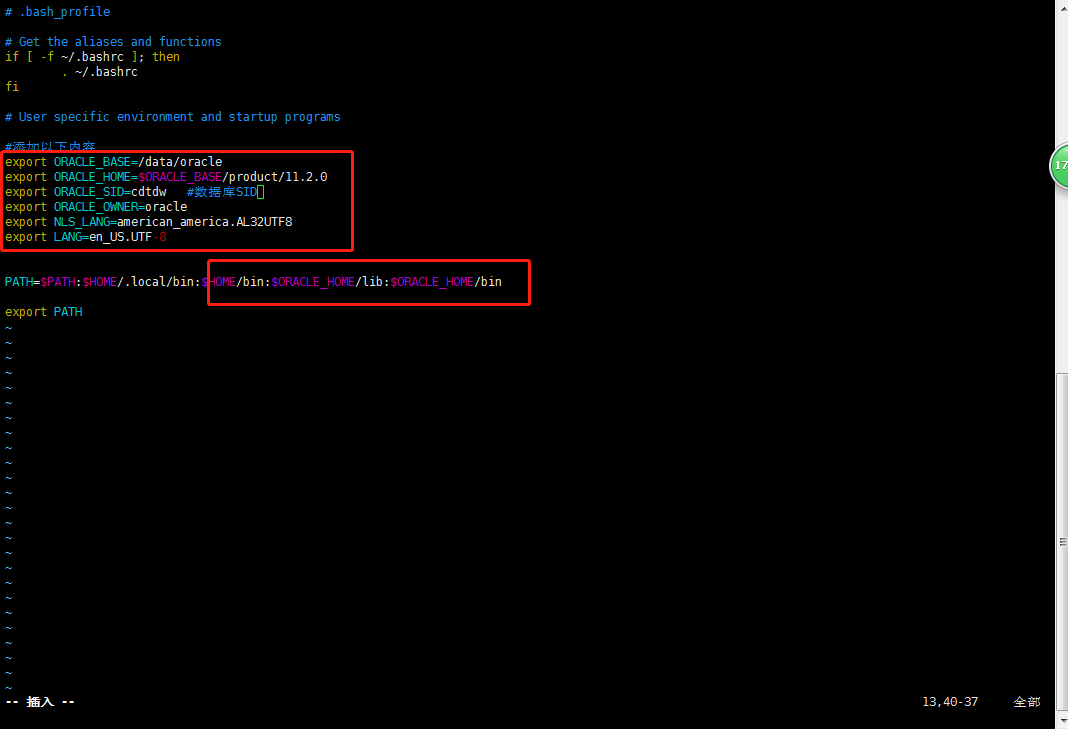
3.4. 在oracle 用户下安装
#进入解压目录 [oracle@cdtdw ~]$ cd /software/database [oracle@cdtdw database]$ ./runInstaller -silent -ignorePrereq -responseFile /data/oracle/db_install.rsp /home/database是安装包解压后的路径,此处根据安装包解压所在位置做修改,因人而异。 runInstaller 是主要安装脚本 -silent 静默模式 -force 强制安装 -ignorePrereq忽略warning直接安装。 -responseFile读取安装应答文件。
执行结果如下图:
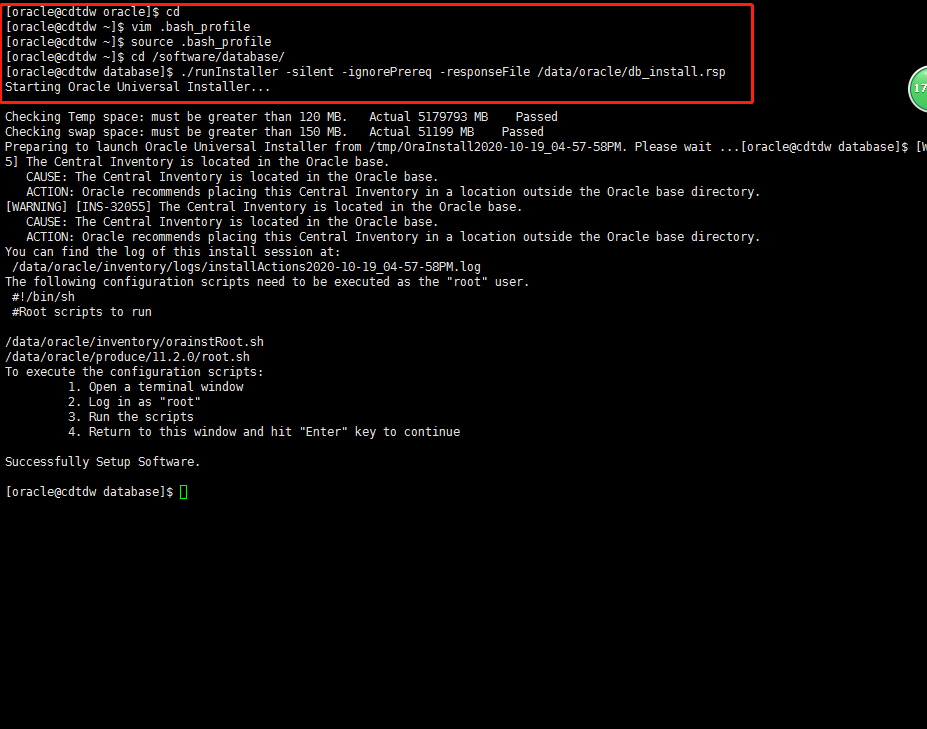
根据提示内容,切换root用户执行以下语句。
/data/oracle/inventory/orainstRoot.sh /data/oracle/product/11.2.0/root.sh
如下面执行界面所示,需先切换到root用户,再到相应的文件夹执行文件,如下图所示:

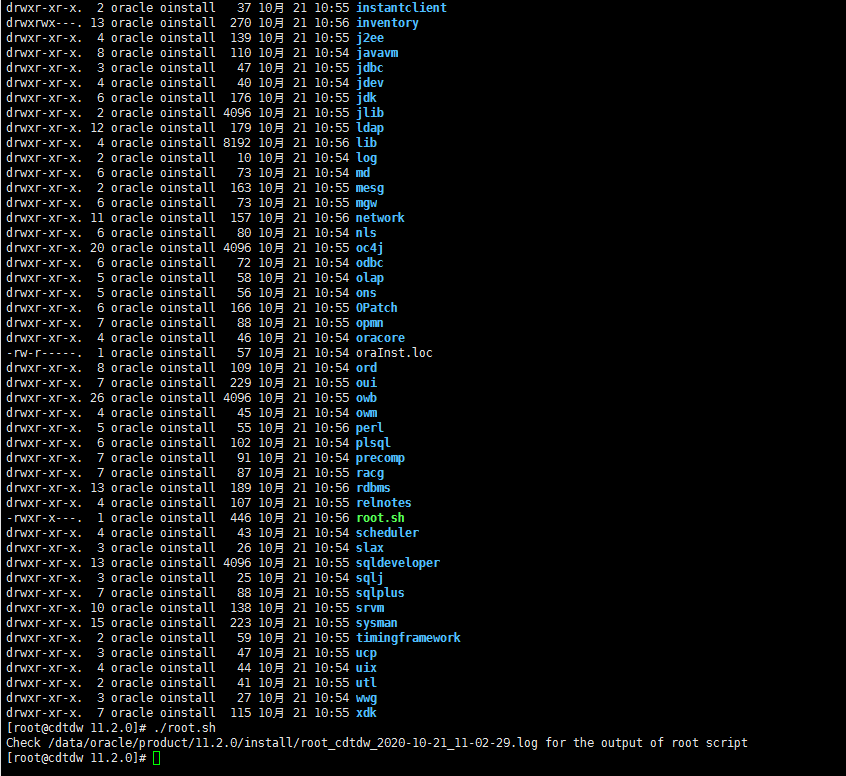
四、以静默方式配置监听
[oracle@oracle ~]$ netca /silent /responseFile /data/oracle/netca.rsp
执行如下图所示,注意要切换为oracle用户来执行,在用户的家目录下:
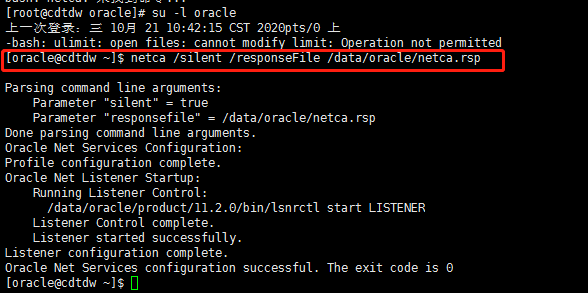
成功运行后,在/data/oracle/product/11.2.0/network/admin/中会生成listener.ora和sqlnet.ora文件,如下图可查看到:

五、以静默方式建立新库,同时也建立一个对应的实例
[oracle@oracle ~]$ vim /data/oracle/dbca.rsp GDBNAME= "cdtdw" SID =" cdtdw" SYSPASSWORD= "com.oracle2020" SYSTEMPASSWORD= "com.oracle2020" SYSMANPASSWORD= "com.oracle2020" DBSNMPPASSWORD= "com.oracle2020" DATAFILEDESTINATION=/data/oracle/oradata RECOVERYAREADESTINATION=/data/oracle/fast_recovery_area CHARACTERSET= "AL32UTF8" TOTALMEMORY= "51200" 其中TOTALMEMORY ="51200" 为51200MB,物理内存50G,因为我服务器内存有100G。
配置好这个文件后,进行静默配置,需使用oracle用户,在其家目录下执行以下语句,执行效果如下图,可以下图中上半部分有问题的命令内容:
[oracle@oracle ~]$ dbca -silent -responseFile /home/oracle/response/dbca.rsp
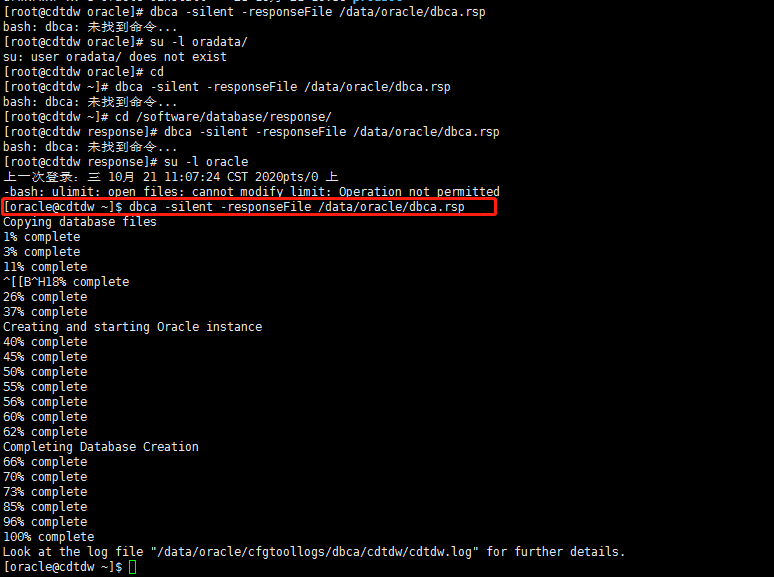
查看监听状态:
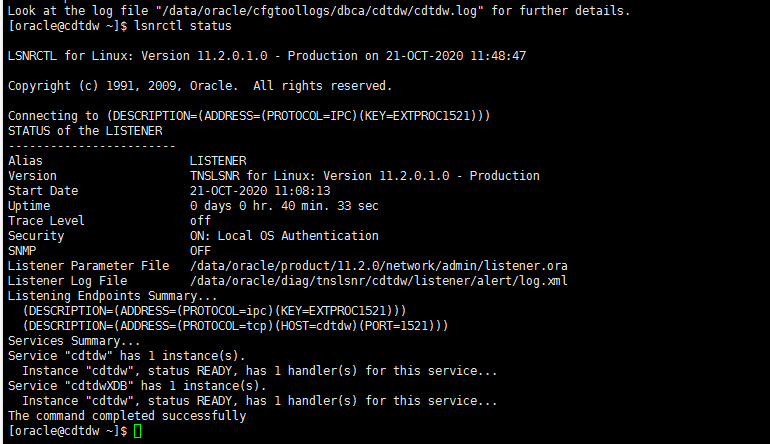
登陆查看实例状态:
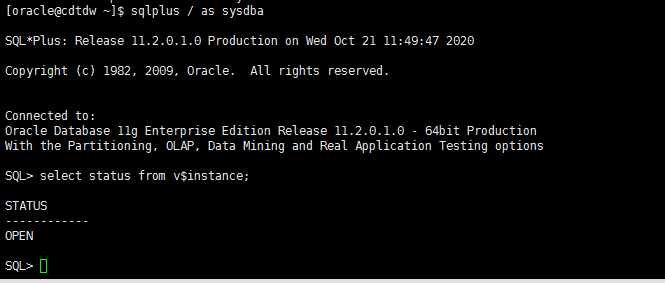
六、创建表空间与用户
6.1.创建表空间
create tablespace cdtdw logging datafile'/data/oracle/oradata/cdtdw/cdtdw.dbf' size 1024m autoextend on next 100m maxsize 10240m extent management local;
6.2.创建用户
create user cdtdw identified by cdtdw default tablespace cdtdw;
6.3.给用户赋权限
#为了省事,先把DBA权限赋值。
grant dba to cdtdw;
最上面有一条语句是用于删除表空间的,可以一起学习下。
--删除非空表空间,包含物理文件
drop tablespace tablespace_name including contents and datafiles;
七、链接测试
八、设置开机启动
8.1.修改/data/oracle/product/11.2.0/bin/dbstart


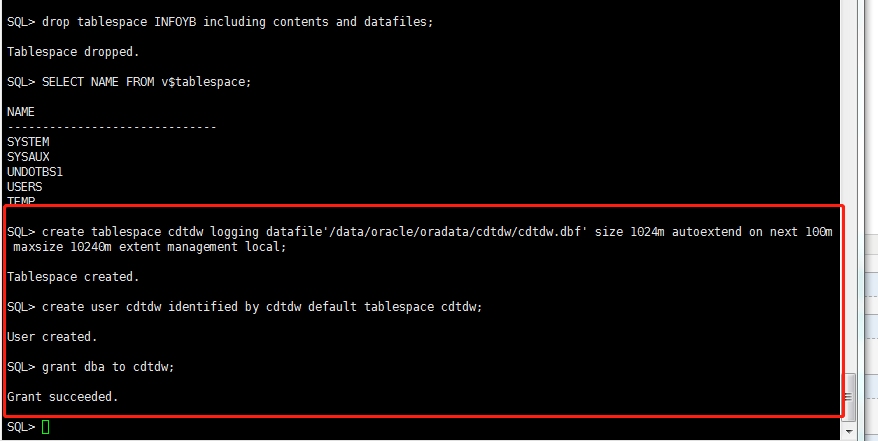

 浙公网安备 33010602011771号
浙公网安备 33010602011771号